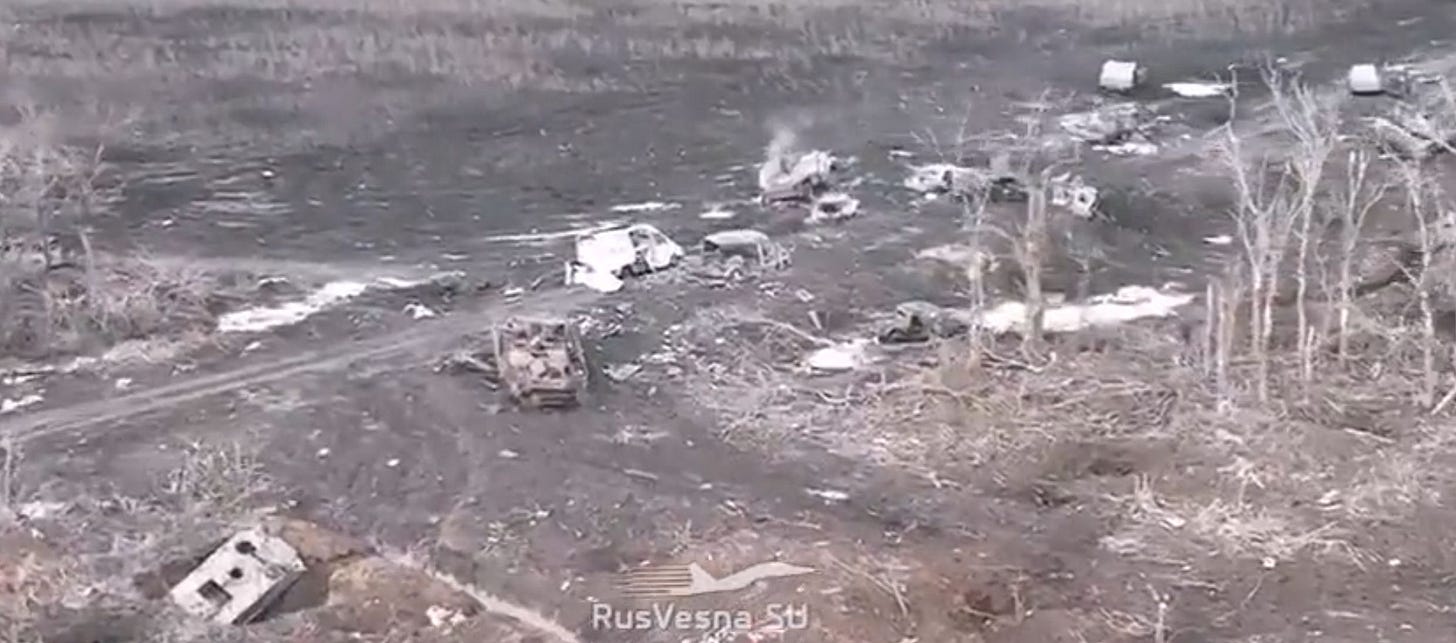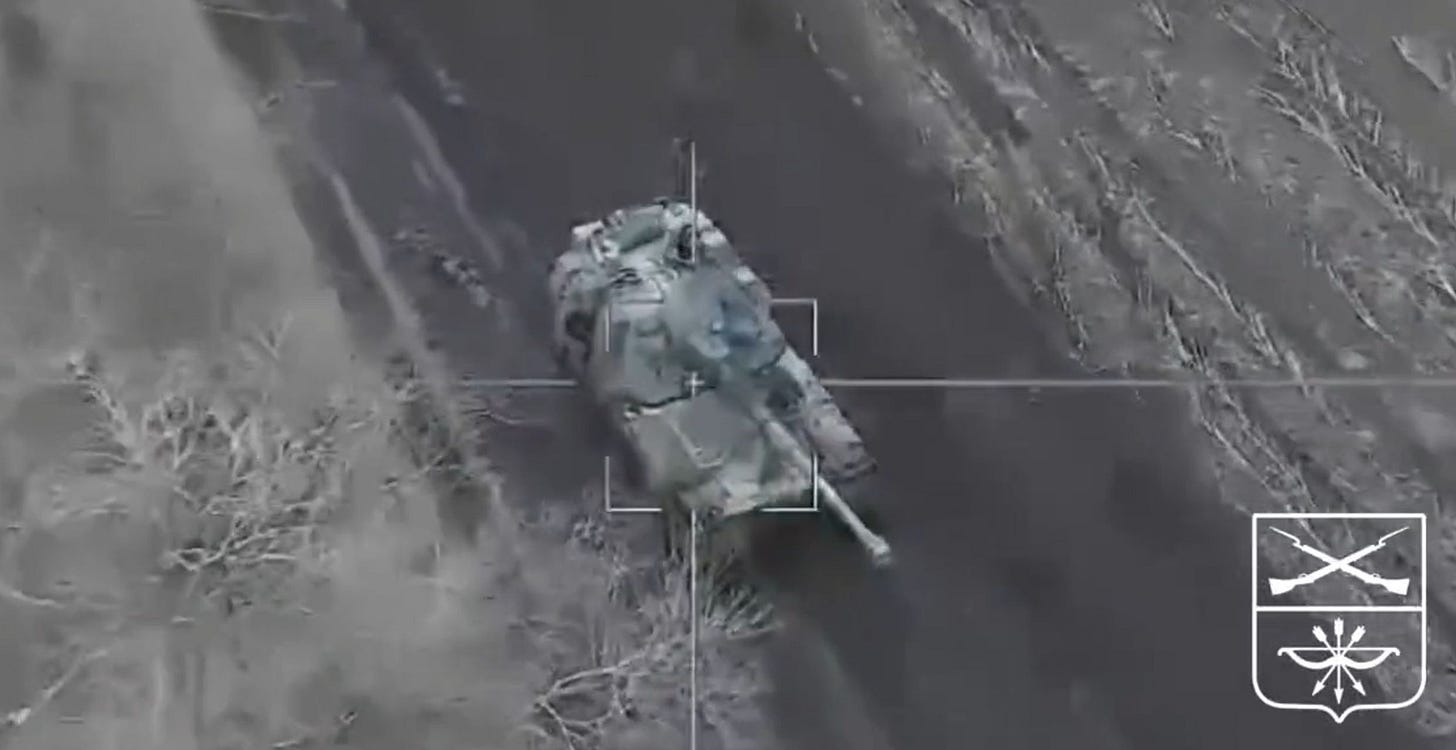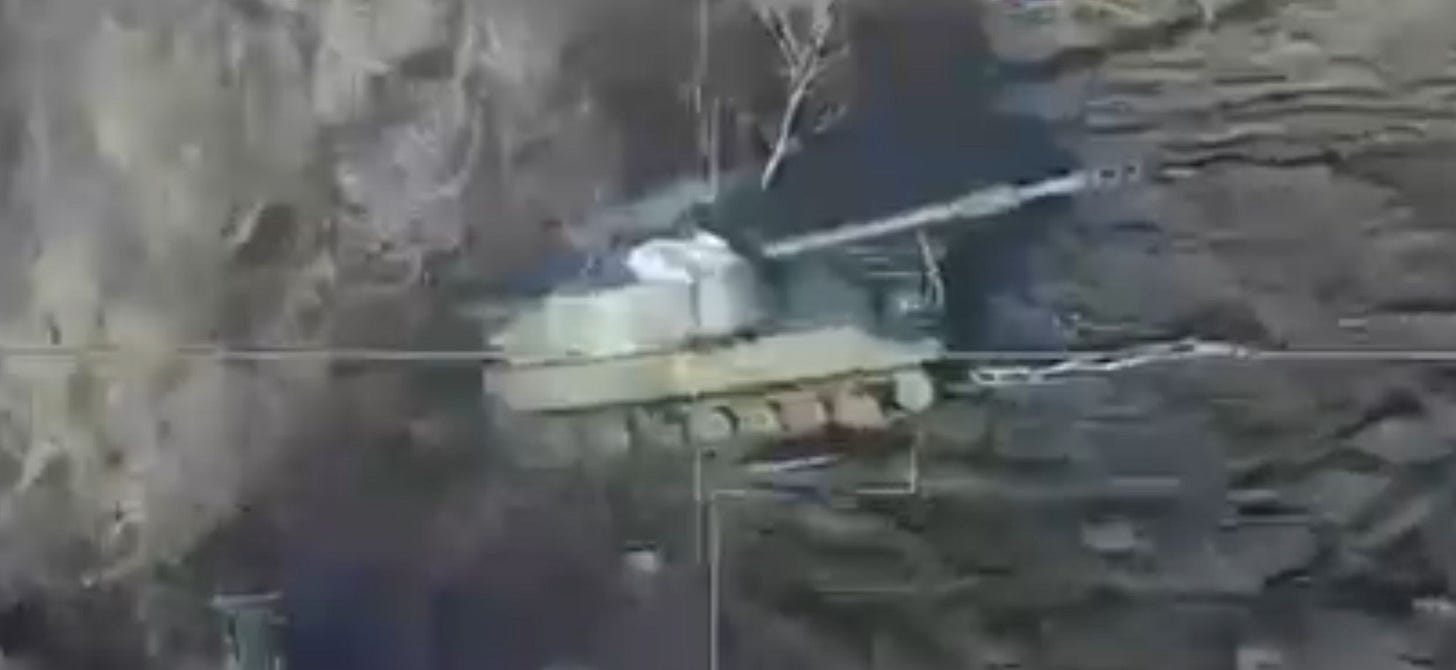Ukraine War, 15 April 2023
Hello everybody!
Kind of ‘didn’t intend‘ another post so quickly after the last one, but have received so many of same questions from different readers, that I think it’s at least the time for something like ‘Q&A Session’.
1.) Is Russia going to win in Bakhmut?
By now, yes, this is likely.
The reason is this: contrary to the situation back in January, when the ZSU was still trying to ‘seriously’ defend Bakhmut, meanwhile it switched its strategy. In what is called the ‘economy of force’ in military jargon, it’s tying down the maximum number of enemy units with a minimum number of own units, while imposing massive casualties to the opponent.
Let me explain this a bit.
In the social media there’s still the impression of ‘a large number of different ZSU units’ being deployed inside Bakhmut. This was the case back in January, but is not the case any more. The ZSU is rotating in and out only limited contingents from relatively few units (some 7-8 brigades in total): this is what’s resulting in reports about ‘many different units’ nowadays. Actually, and usually, each contingent is in the town for between 2 and 7 days, then withdrawn. The reason for this is avoiding exhaustion of troops: after a few days of constant combat contact, any troops become fatigued. They are not sharp enough to recognize or avoid danger any more, and start taking casualties. Even more so under the present weather conditions. Thus, the ZSU is rotating them out, while bringing a new contingent in.
This way, the Russians – who appear not to be rotating their units in and out as regularly – are all the time fighting ‘fresh Ukrainian troops’, and that with their depleted and worn out units. At the same time, the mass of the ZSU is not even involved in the fighting: it’s well to the rear, resting, reorganising, training/re-training, kept back as reserve.
This strategy is necessary because – as mentioned time and again – Ukrainians correctly concluded that there is no way around forcing Putin into giving up his designs, without a colossal destruction of the VSRF: without causing massive casualties to the Russian armed forces. And since ZSU lacks the necessary volumes of high explosives (see: artillery shells), its left without a choice but to find alternatives.
This is obvious from the following, too: in reaction to massive deployment of TOS-1 and heavy mortars by the VDV, and while lacking enough shells to respond in fashion, since about three weeks the ZSU developed new ‘tactics’. It’s mining selected big building/s in Bakhmut (especially taller ones), then letting the Russians take one of these, then blowing it up. If the Russians do not send enough troops, Ukrainians counterattack and then kill everybody inside. Then the entire process is repeated. Reportedly, several companies of VDV and Russian PMCs have been almost completely destroyed this way.
The Russians are complaining this is ‘disgusting’ and it is Ukrainians who are ‘destroying Artemovsk’ (Russian name for Bakhmut); indeed, it seems this is what caused so much frustration that they began beheading captured Ukrainian troops. No doubt, that’s going to appear ‘truth’ to any of decent Putin-fan, but mind that it wasn’t Ukraine (nor ‘NATO’) that invaded Russia. Cold fact is that Russia invaded Ukraine, and it was Russia that demolished most of the town by its artillery already in summer and autumn the last year. Therefore, Bakhmut wouldn’t have been destroyed without a Russian attack on it.
Bottom line: no, contrary to some of Russian claims, Ukrainians in Bakhmut are - still - not ‘encircled’. Despite few successful counterattacks, earlier this week, they’ve lost additional positions in the north- (see: City People's House in Rose Alley and few blocks south of it) and the centre of the town (Railway Station 2), but they did so ‘in controlled fashion’, and while causing additional, heavy casualties to the VDV.

2.) Does this make any Ukrainian Counteroffensive more likely? Are Ukrainians going to attack the flanks of the Russian assault into Bakhmut? If not, when and where is an Ukrainian counteroffensive going to take place?
Nope, it does not, and no clue (and even if I would have one, I wouldn’t share it in the public).
Sure, the ZSU has enough troops. Even if most of (if my quick count is right) 14-20 newly-established brigades is meanwhile ‘operational’ – i.e. have received their equipment and concluded their training – this alone is not enough for an offensive.
Keep in mind that the ZSU was never short on troops. As of the autumn last year, it was in the process of bolstering every of existing brigades with 5th and 6th battalions (usually: rifle battalions). Since early this year, this pattern has changed and now the ZSU is increasing the number of brigades instead, while downsizing them to something like ‘reinforced regiments’ (say: 1,200-2,000 troops, a company of MBTs and a relatively small artillery group).
That said, the ZSU remains critically short on electronic warfare and air defence systems, artillery shells, and it remains short on heavy infantry weapons (mortars, automatic grenade launchers, heavy machine guns). It still has too few of these even for defence of Bakhmut. In this regards, nothing has changed at all since the start of this war (with other words: I’m repeating myself, again, and again, and again, ever since early March last year; thus it’s about the time to stop asking me the same questions). If anything changed then in so far that the Kyiv’s and Western reluctance bought plenty of time for the System Putin to adapt (like when they launched the production of UMPKs with help of Chinese electronics).
This is unlikely to change any time soon because both Kyiv and NATO were too late with realising that the war is not going to be ‘over by Christmas’ (2022). Moreover, they’ve squandered something like half a year discussing ‘tanks’ and ‘F-16s’, instead what the ZSU really needs: it was only in January that Kyiv began calling for urgent deliveries of heavy infantry weapons, for example. Thus, instead of ramping up production of artillery shells already back in spring of the last year, both have started doing so only the last few months. Even if the production of shell-casings per se can be accelerated quite quickly (all provided there is the political will and thus the funding necessary to do so), that of their explosive fillers can’t. Thus, the production is still in the process of being increased, and – depending on manufacturers in question – is going to take most of the next 6 to 12 months to reach the necessary levels.
This is even more important because the mild winter is enabling the Russian artillery to recover some of its effectiveness: Orlan-10s are back in the skies, and thus MSTA-S, Giatsints and Lancets are back at regularly striking Ukrainian artillery – and air defences, too. And the VKS is continuously increasing its use of UMPKs, as reported two days ago (over the last week, strikes by such and similar weapons have been reported all the way from the Sumy area, via Avdiivka, down to Orikhiv and Hulaypolye in Zaporizhzhya, to Beryslav in northern Kherson).

Moreover, the soil is still wet and muddy. It is impossible to run even a serious infantry-dominated offensive under the current conditions. The way the weather is this year, that’s unlikely to change before mid-May.
Therefore, and regardless of lots of panicky reports in the Russian social media (and guessing about possible directions of an Ukrainian counterattack), and all sorts of wishful thinking (especially in the Ukrainian media, but also all the way up to Washington DC) any kind of thinking in direction of an Ukrainian counteroffensive is, right now, little more than daydreaming. That is going to remain that way for a while longer.
3.) What do I think about ‘Pentagon Leak’, reporting about which is meanwhile dominating the headlines in the Western media?
‘Nothing special’. The Pentagon is ‘leaky’ for ages already. Primary reason are policies-related issues. I.e. usually, somebody would ‘leak’ some piece of info in order to influence civilian policy-makers. In this case, somebody did so in order to make himself look more important between his friends. That’s the principal difference.
Amid all of this I think it’s actually absurd – but perfectly understandable considering the degree to which political corruption destroyed tools of state control in the USA (while all the time damning the ‘state’) – when some are complaining about ‘rampant over-classification’ in the US armed- and intelligence services, but at the same time these are providing any kind of ‘top secret’ intel to members of the National Guard. Especially while, and just for example, the USAF Intelligence Agency is prosecuting a veteran (and retired) Boeing RC-135-pilot for supposedly making use of some paper declassified back in the 1990s, but then re-classified so the USAF-IA can prosecute the veteran in question at discretion of one of its officers eager to mark his territory….
Yeah… I’m digressing. Well, yes I do, but I’m explaining you my position and depth of perception, too.
The question is: WTF does an IT-specialist of the National Guard needs to know anything about Ukraine? I doubt even those responsible for granting security clearances to a (de-facto) teenager with tendency to impress his younger friends can provide a meaningful answer.
As about the content of the leaked papers: the only surprise is how little the US armed forces and intelligence services know (or think to know) about the ZSU. I’m stating this because the mass of ‘intelligence’ in these papers can be collected by the means of so-called ‘open source intelligence’, foremost the social media. Indeed: the mass seem to have been collected from blogs like Oryx, or the Pentagon’s daily news-briefs, and similar instances. Sure, that’s awfully lots of work, thus thanks for saving me a lot of the same, dumbass, but: really the papers contain so little ‘news’, so little ‘serious intelligence’, for me it’s almost shocking – but also reassuring – the US armed forces know as little about the ZSU.
Why reassuring? Because we’ve all the time been fed with a steady diet of US complaints how they can’t trust Ukrainians (because there would be so many traitors there), and how Ukrainians aren’t sharing intel with them…. and now it turns out the actual weak spot is in the USA, and Ukrainians were right not to share anything really sensitive.
4.) US-Americans – or at least the US media – is, once again, complaining about the Russians jamming the GPS-signals in Ukraine and thus rendering weapons like M142 HIMARS, M270 MLRS, and JDAMs ineffective?
A ‘big surprise’, isn’t it? No, it isn’t. Already the Iraqis were effectively jamming GPS, back in 2000-2003 period: the Pentagon lied this couldn’t be jammed, though. What a surprise if the Russians – heavily dependent on electronic warfare at least since studying Israeli operations in Lebanon of 1982 – are doing so in the Year 2023. Especially if provided with enough time to adapt to local circumstances and develop necessary electronic countermeasures, as is happening the last 7-8 months.
***
Let me end this one with a sort of ‘message’ for all those (still) convinced the War in Ukraine is really something like ‘(Putin’s holy) war against globalism’.
While most of the West is continuously complaining about the lack of skilled workforce, but doing very little to solve this problem (actually: many of our governments are hell-or-bent on increasing it), yet counting on the Russians running out of the necessary combination of troops and the workforce, the System Putin appears to be working very hard to solve this issue at home.
Between others, Moscow and New Delhi are negotiating ways to attract Indian employees to the Russia, to lessen the critical shortage of Russian workforce. From what I’ve got to hear, the Russians are aiming to avoid a situation where they might become overdependent on the Chinese workforce and know-how: correspondingly, they’re seeking cooperation with India in regards of infrastructure development, trade, etc. RUMINT has it Moscow is so keen in this regards, that it should have offered a special social security pact for the resulting Indian diaspora…
Of course, one can have doubts about the ability of the System Putin to let thousands of Indians come to Russia and run large parts of the industry and infrastructure. Thanks to Putin, Russians became more chauvinist and racist than ever before. Point is: there are lots of well-educated but jobless Indian youngsters; Indian public is predominantly supportive for Russia in this war, and one should have no doubts that many of them are ready to go.
The only thing absurd about this is: ‘globalism’ began at least when the people of Hebron constructed a road to Jenin, so to have it easier to trade their produce, at least 11,000 – some say: as long as 14,000 - years ago. Think it’s about the time to realise that one can’t stop this process just because somebody dislikes the effects of corruption upon our societies, or people with different taint, economic- or religious backgrounds: corruption has to be countered in an entirely different fashion than by daydreaming about some sort of ‘war against globalism’.




